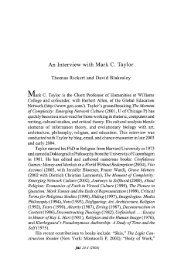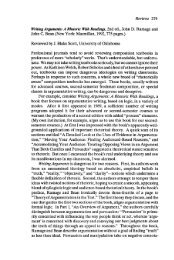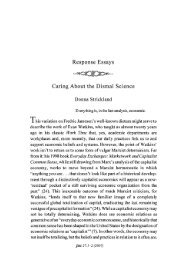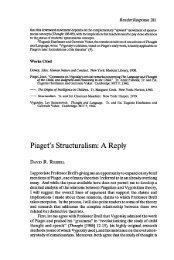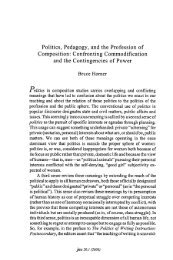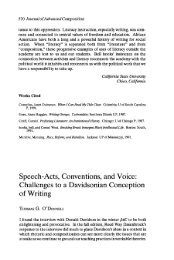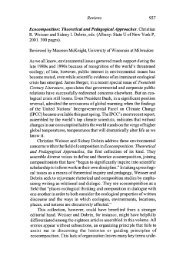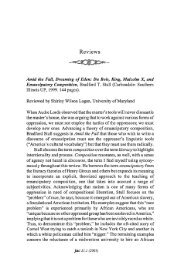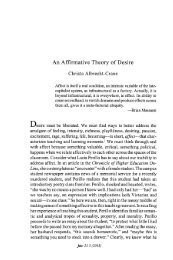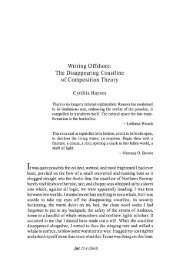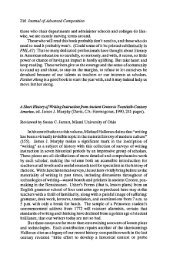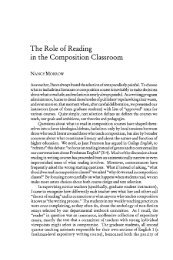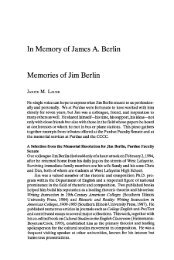Some Thoughts on Expressive Discourse: A Review ... - JAC Online
Some Thoughts on Expressive Discourse: A Review ... - JAC Online
Some Thoughts on Expressive Discourse: A Review ... - JAC Online
Create successful ePaper yourself
Turn your PDF publications into a flip-book with our unique Google optimized e-Paper software.
<strong>Expressive</strong> Writing 89<br />
pers<strong>on</strong>al level, I finally realized that I could allow myself not <strong>on</strong>ly to get<br />
intrigued but even attracted to her theoretical model and still not have to<br />
renounce all these practices that she thinks d<strong>on</strong>'t exist or that I shouldn't use<br />
in my teaching and my writing: writing for an audience of self; writing wholly<br />
about <strong>on</strong>e's own experience; freewriting and exploratory or exercise writing<br />
that is not meant to be developed into a more structured text or finished<br />
product. Her interesting categories of discourse and her illuminating model<br />
would work fine to help the professi<strong>on</strong> see and talk more clearly about all<br />
these disputed practices; they would provide us with good tools even if we<br />
want to argue for them. Her model of discourses makes a perfectly comfortable<br />
place even for the species of discourse or behavior she calls<br />
n<strong>on</strong>existent-writing <strong>on</strong>ly for the self-for there is nothing inherent in her<br />
model of generative text or text itself that entails her pers<strong>on</strong>al beliefthat they<br />
are always for readers other than self.<br />
I find, therefore, that <strong>on</strong>ce I untangle the troubling subtext I have no<br />
difficulty giving an interested and respectful reading to her main enterprise.<br />
Let me focus <strong>on</strong> it for the rest of this review. I will questi<strong>on</strong> some points she<br />
has made, but I think it will be clear that I am airing these questi<strong>on</strong>s not out<br />
of a wish to criticize but out of my own genuine uncertainties and in order to<br />
communicate better some ofthe interesting cruxes in her proposals. In every<br />
case, I feel grateful and respectful about what she is proposing in this major<br />
dimensi<strong>on</strong> of her book. Her proposed terms or categories not <strong>on</strong>ly clarify my<br />
thinking, but in the last analysis I think she might be right. I end up torn.<br />
<str<strong>on</strong>g>Some</str<strong>on</strong>g> Key Questi<strong>on</strong>s<br />
Harris does indeed show how theorists have allowed the term "expressivediscourse"<br />
to slide allover the map. Besides the more obvious meanings,<br />
we see people like Kinneavy saying that all discourse comes from an expressive<br />
impulse, people like Britt<strong>on</strong> saying that expressive discourse is the<br />
matrix from which all other discourse comes, and a frequent tendency for<br />
people to talk of all literature as expressive. I guess I have a few hesitati<strong>on</strong>s<br />
about whether this means we actually have to get rid of the term, or can, for<br />
what she herself calls the "core" meaning is str<strong>on</strong>g and clear: "One of the few<br />
stable criteria for describing expressive discourse has been its subjectivity-the<br />
idea that it reveals something about the pers<strong>on</strong> who created it" (145). Thus,<br />
it might make more sense simply to define the term that way and then go <strong>on</strong><br />
to acknowledge that there have also been certain other extreme or ambitious<br />
definiti<strong>on</strong>s that we would do well to recognize as special senses of the term.<br />
After all, not many people seem to use the word "expressive" for a rough<br />
messy disorganized first draft of a grant proposal or a descripti<strong>on</strong> of the organizati<strong>on</strong>al<br />
structure of a company just because it is a rough, messy,<br />
disorganized first draft-so l<strong>on</strong>g as it is primarily factual and detached. C<strong>on</strong>versely,<br />
not many people seem to deny the term expressive to a piece of<br />
writing that is very pers<strong>on</strong>al, subjective and full of the affect, pers<strong>on</strong>a, self, or



